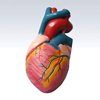Article
Alcohol Ablations More Effective in Blocking Atrial Fibrillation than Standard Therapy
Author(s):
Instead of standard radio wave therapy, doctors are experimenting with alcohol ablations to prevent accidental triggering of arrhythmia.

Atrial fibrillation can be treated by adding a little ethanol to minimally invasive therapies, according to a study published in the Journal of the American College of Cardiology.
By adding 4 or fewer injections of 98% ethanol to the catheter-aided radio wave ablation of nerve clusters near the vein of Marshall, the nerves triggering arrhythmia were damaged or killed. Doctors were then unable to artificially trigger atrial fibrillation using electricity, which is used to determine if ablations were successful.
“Radiofrequency ablation carries risks of collateral damage to other structures and there are also risks associated with surgical approaches,” Miguel Valderrábano, MD, chief of cardiac electrophysiology at Houston Methodist DeBakey Heart & Vascular Center, said in a press release. “We show that chemical ablation with alcohol can achieve elimination of abnormal nerve activity, introducing a catheter through a neck vein and doing all the work through it.”
Instead of current standard surgical therapy, a concentrated radio wave that causes tissues in small areas to burn and scar, the alcohol therapy appeared to be more effective. Additionally, the researchers hope that the alcohol ablations would improve effectiveness of standard therapies. Currently, patients sometimes need a second ablation months or years later. Valderrábano and others are investigating improvements to ablation procedures so they only need to be completed once.





